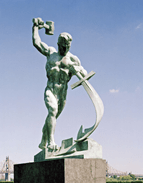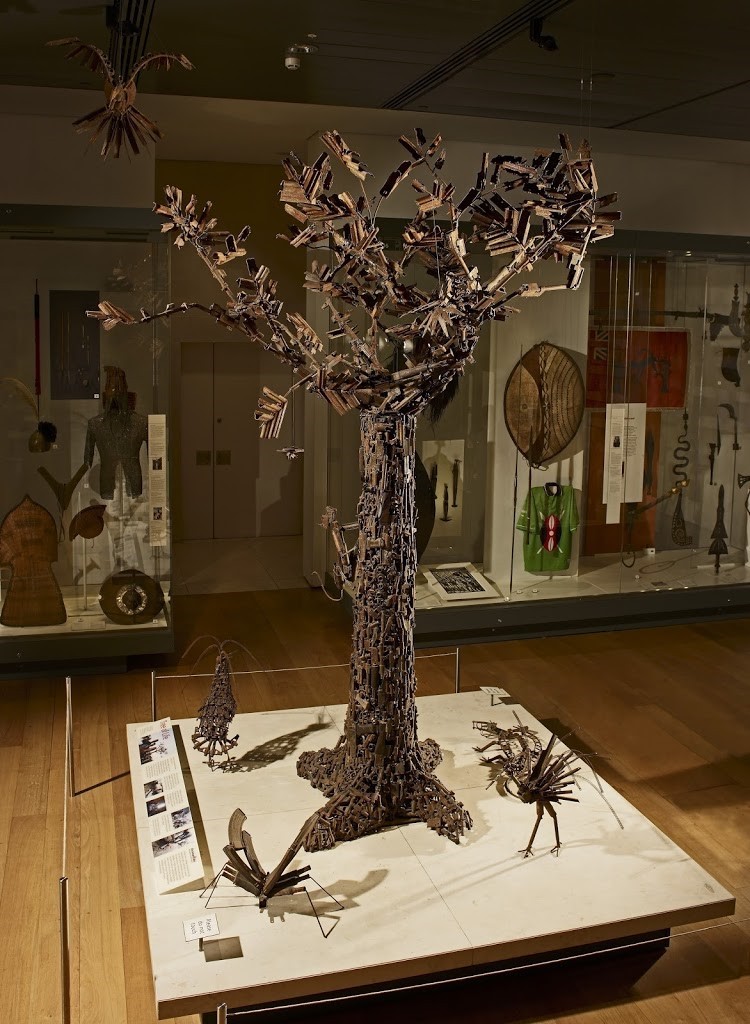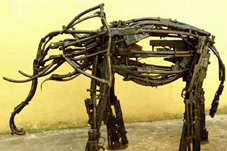Biblical Passages
Isaiah 2:1-5: This is what Isaiah, son of Amoz, saw concerning Judah and Jerusalem: In the last days the mountain of the LORD’s temple will be established as chief among the mountains; it will be raised above the hills, and all nations will stream to it. Many peoples will come and say, ‘Come, let us go up to the mountain of the LORD, to the house of the God of Jacob. He will teach us his ways, so that we may walk in his paths.’ The law will go out from Zion, the word of the LORD from Jerusalem. He will judge between the nations and will settle disputes for many peoples. They will beat their swords into ploughshares and their spears into pruning hooks. Nation will not take up sword against nation, nor will they train for war anymore. Come, O house of Jacob, let us walk in the light of the LORD.
Isaiah 9:2-7: The people walking in darkness have seen a great light; on those living in the land of the shadow of death a light has dawned. You have enlarged the nation and increased their joy; they rejoice before you as people rejoice at the harvest, as soldiers rejoice when dividing the plunder. For as in the day of Midian’s defeat, you have shattered the yoke that burdens them, the bar across their shoulders, the rod of their oppressor. Every warrior’s boot used in battle and every garment rolled in blood will be destined for burning, will be fuel for the fire. For to us a child is born, to us a son is given, and the government will be on his shoulders. And he will be called Wonderful Counsellor, Mighty God, Everlasting Father, Prince of Peace. Of the increase of his government and peace there will be no end. He will reign on David’s throne and over his kingdom, establishing and upholding it with justice and righteousness from that time on and forever. The zeal of the LORD Almighty will accomplish this.
Isaiah 11:6-9: The wolf will live with the lamb, the leopard will lie down with the goat, the calf and the lion and the yearling together; and a little child will lead them. The cow will feed with the bear, their young will lie down together, and the lion will eat straw like the ox. The infant will play near the cobra’s den, and the young child will put its hand into the viper’s nest. They will neither harm nor destroy on all my holy mountain, for the earth will be filled with the knowledge of the Lord as the waters cover the sea.
Isaiah 35:1-10: The desert and the parched land will be glad; the wilderness will rejoice and blossom. Like the crocus, it will burst into bloom; it will rejoice greatly and shout for joy. The glory of Lebanon will be given to it, the splendour of Carmel and Sharon; they will see the glory of the Lord, the splendour of our God. Strengthen the feeble hands, steady the knees that give way; say to those with fearful hearts, “Be strong, do not fear; your God will come, he will come with vengeance; with divine retribution he will come to save you.” Then will the eyes of the blind be opened and the ears of the deaf unstopped. Then will the lame leap like a deer, and the mute tongue shout for joy. Water will gush forth in the wilderness and streams in the desert. The burning sand will become a pool, the thirsty ground bubbling springs. In the haunts where jackals once lay, grass and reeds and papyrus will grow. And a highway will be there; it will be called the Way of Holiness; it will be for those who walk on that Way. The unclean will not journey on it; wicked fools will not go about on it. No lion will be there, nor any ravenous beast; they will not be found there. But only the redeemed will walk there, and those the Lord has rescued will return. They will enter Zion with singing; everlasting joy will crown their heads. Gladness and joy will overtake them, and sorrow and sighing will flee away.
Isaiah 65:17-25: “See, I will create new heavens and a new earth. The former things will not be remembered, nor will they come to mind. But be glad and rejoice forever in what I will create, for I will create Jerusalem to be a delight and its people a joy. I will rejoice over Jerusalem and take delight in my people; the sound of weeping and of crying will be heard in it no more. Never again will there be in it an infant who lives but a few days, or an old man who does not live out his years; the one who dies at a hundred will be thought a mere child; the one who fails to reach[a] a hundred will be considered accursed. They will build houses and dwell in them; they will plant vineyards and eat their fruit. No longer will they build houses and others live in them, or plant and others eat. For as the days of a tree, so will be the days of my people; my chosen ones will long enjoy the work of their hands. They will not labour in vain, nor will they bear children doomed to misfortune; for they will be a people blessed by the Lord, they and their descendants with them. Before they call, I will answer; while they are still speaking, I will hear. The wolf and the lamb will feed together, and the lion will eat straw like the ox, and dust will be the serpent’s food. They will neither harm nor destroy on all my holy mountain,” says the Lord.
Micah 5:2-5: But you, Bethlehem Ephrathah, though you are small among the clans of Judah, out of you will come for me one who will be ruler over Israel, whose origins are from of old, from ancient times. Therefore, Israel will be abandoned until the time when she who is in labour bears a son, and the rest of his brothers return to join the Israelites. He will stand and shepherd his flock in the strength of the Lord, in the majesty of the name of the Lord his God. And they will live securely, for then his greatness will reach to the ends of the earth. And he will be our peace.
Matthew 2:16-18: When Herod realized that he had been outwitted by the Magi, he was furious, and he gave orders to kill all the boys in Bethlehem and its vicinity who were two years old and under, in accordance with the time he had learned from the Magi. Then what was said through the prophet Jeremiah was fulfilled: “A voice is heard in Ramah, weeping and great mourning, Rachel weeping for her children and refusing to be comforted, because they are no more.”
Luke 1:67-79: His father Zechariah was filled with the Holy Spirit and prophesied: ‘Praise be to the Lord, the God of Israel, because he has come and has redeemed his people. He has raised up a horn of salvation for us in the house of his servant David (as he said through his holy prophets of long ago), salvation from our enemies and from the hand of all who hate us – to show mercy to our fathers and to remember his holy covenant, the oath he swore to our father Abraham: to rescue us from the hand of our enemies, and to enable us to serve him without fear in holiness and righteousness before him all our days. And you, my child, will be called a prophet of the Most High; for you will go on before the Lord to prepare the way for him, to give his people the knowledge of salvation through the forgiveness of their sins, because of the tender mercy of our God, by which the rising sun will come to us from heaven to shine on those living in darkness and in the shadow of death, to guide our feet into the path of peace.’
Luke 2:13-14: Suddenly a great company of the heavenly host appeared with the angel, praising God and saying, ‘Glory to God in the highest heaven, and on earth peace to those on whom his favour rests.’
Romans 8:19-23: For the creation waits in eager expectation for the children of God to be revealed. For the creation was subjected to frustration, not by its own choice, but by the will of the one who subjected it, in hope that the creation itself will be liberated from its bondage to decay and brought into the freedom and glory of the children of God. We know that the whole creation has been groaning as in the pains of childbirth right up to the present time. Not only so, but we ourselves, who have the firstfruits of the Spirit, groan inwardly as we wait eagerly for our adoption to sonship, the redemption of our bodies.
Peace and Violence
1. The story itself is full of violence and threats of violence:
(a) Herod tries to kill the baby Jesus and then slaughters the children of Bethlehem. The Christmas story draws to a close with a horrific scene of brutality and despair.
(b) Joseph takes his family to Egypt as asylum-seekers, fearful of Herod’s threats.
2. Rachel was the wife of Jacob, the father of Israel. She is the mother of the nation, weeping for Israelite children butchered by Herod. There are different kinds and causes of suffering, some large-scale, some small-scale. The ‘slaughter of the innocents’, as this incident is known, was the result of human evil rather than a natural disaster; and it involved only a few children – maybe only a handful of under-2s in the region of Bethlehem. But the weeping, groaning and desperation are the same in all times and places.
3. Not only in Ramah, but in many places across the world today – in conflict zones, in famine areas, among refugees and displaced persons, in areas of disease and disaster – many will be asking the unanswerable question: why? Why my children? What have we done to deserve this? Some will be asking: where was God when this happened? Why didn’t God intervene to save my children?
4. Such experiences challenge our Advent theme of peace. When will the prophetic hope be fulfilled? When will the pain end? What difference has the coming of Jesus made? In fact, to make the questions harder, it was the coming of Jesus that resulted in the death of these children. If he had been born somewhere else, the mothers of Bethlehem would not have been weeping.
5. We dare not offer a trite answer to these questions. In the Christmas story and throughout the Bible we discover that when God does intervene – answering our prayers, changing our circumstances, even sending the Messiah, the consequences are not all positive.
6. Simeon told Mary when he took the baby Jesus in his arms: ‘This child is destined to cause the rising and falling of many in Israel, and to be a sign that will be spoken against, so that the thoughts of many hearts will be revealed. And a sword will pierce your own soul also’ (Luke 2:34-35).
7. Jesus himself said when he grew up: ‘Do not suppose that I have come to bring peace to the earth. I did not come to bring peace, but a sword’ (Matthew 10:34). Although he brought a message of peace and lived this out consistently and creatively, his life and teaching were provocative, challenging the way people thought and behaved, revealing their inner motives. This led to division, conflict and suffering.
8. So how do we pull all this together?
(a) The promise of peace is at the centre of the Christmas story. The Prince of Peace has come. His life and teaching show us what God’s shalom means. Peace with God, peace with ourselves, peace in communities and peace between nations are all available now to those who respond to this Prince of Peace and follow him.
(b) But God does not impose this peace on individuals or on the world. This was what the disciples expected, but it was not the way of Jesus. Instead, God invites people to receive and live out this peace. There is no other way: true peace cannot be imposed.
(c) Throughout history, as God has waited patiently, some have chosen the way of peace, but many more have not. The outcome has been continuing pain and suffering, often (as in Bethlehem) as a result of human cruelty, sometimes as a result of the groaning of creation waiting for the healing of a broken world.
(d) So, we still await the fulfilment of the prophetic hope. Each Advent season we look forward both to the coming of the Prince of Peace in Bethlehem and the inauguration of the kingdom of God and to his return to bring in fully this kingdom of justice, peace and joy the prophets speak of.
(e) Until then we live with the tension that in this in-between time we often don’t know how to act or pray. Even when God does intervene in answer to our prayers and longings, some of the consequences trouble us. Maybe a God who refuses to impose peace can only do so much in a fallen world. Maybe that’s why God does not intervene more, because the consequences are so mixed.
(f) So, we rejoice in the coming of the Prince of Peace, we receive the song of the angels, we celebrate any outbreak of the peace they proclaimed, we weep with Rachel and bring what comfort we can, we share in the groaning of creation, we trust that God is at work in often unseen ways to bring healing and reconciliation, and we keep alive the rumour of peace that Christmas brings each year.
Peace among Nations
1. Advent is the end and the beginning of the church year – a time of waiting, when we look forward both to celebrating again the first coming of Jesus in Bethlehem and to his second coming at the end of this age.
2. God came to us quietly as Immanuel (God with us) 2000 years ago and the world has never been the same; but one day God will be with us in full splendour and every eye will see him and every knee will bow.
3. This double focus appears in the teaching of Jesus, when he speaks of the kingdom of God having arrived already AND still being ahead. Because the kingdom has arrived, sick people are healed, the hungry are fed, enemies are reconciled and the poor receive justice. But because the kingdom has not yet fully come, there are still many sick, poor, hungry and unreconciled people. We live with this tension, this waiting period.
4. The Old Testament prophets quite often spoke about ‘the last days’. Their hope was that finally, in the last days, God would act decisively to transform their world. When he did:
(a) Darkness would be replaced by light.
(b) Violence would be replaced by peace.
(c) Oppression would be replaced by justice.
5. They use powerful images of what the last days will be like:
(a) The temple mountain in Jerusalem rising to become higher than all mountains and a huge crowd of people from all nations gathering to receive God’s laws and wisdom.
(b) An end to military training and old ways of handling conflict as God settles disputes between nations.
(c) Armaments and weapons have become redundant. Some are simply destroyed, but others are redeemed for new uses – swords turned into ploughshares.
(d) Light shining into a dark valley, bringing the joy of a great harvest to people who had almost lost hope.
6. In the last days there will be peace, not war, between nations. The child we await is the Prince of Peace. He will rule the world with justice and peace. Weapons and military training will no longer be needed. Swords will be beaten into ploughshares.
7. But we celebrate Advent in a world racked with war and conflict, inundated with weapons, seemingly as far from peace as ever. How do we hold together our hope in Christ and the stark realities around us?
8. Jesus was born in the Roman Empire. Joseph and Mary were only in Bethlehem because of an imperial decree. The Romans had a word for peace – ‘pax’. The ‘Pax Romana’ was an imposed peace, based on the threat of violence. Keep in line, keep quiet or we will send in our army! But that’s not the Advent hope.
9. Advent hope is not imposed Roman peace. Nor is it only peace with God. But the hope of nations no longer at war, enemies reconciled, communities flourishing, Israelis and Palestinians sharing the land and becoming friends. Communities in Iraq, Syria and across the world accepting and valuing those who are different from them. Weapons of war decommissioned. Extremes of wealth and poverty abolished. Criminals seeking forgiveness from their victims.
10. And the Christmas story gives us clues as to how this might happen. It’s a story of risk and vulnerability, of hidden events and quiet conversations. Despised shepherds are welcome visitors. Foreign astrologers are honoured guests. Peace cannot be imposed. It grows as we learn to trust and learn to love.
11. Advent is a waiting season. We await the birth of the Christ-child, and we await his return to fulfil all our hopes and the hopes of the prophets. Until then we still pray: your kingdom come! But our waiting is to be active. As followers of the Prince of Peace, we are called to work for peace as well as praying for peace. We don’t kid ourselves that what we do can bring an end to war and conflict, for the kingdom has not yet fully come, but we refuse to be passive, to accept a violent status quo.
12. And the prophets’ vision has inspired creative peace-making – some of it symbolic and some very practical. One of the images that has resonated most strongly – beyond the church as well as within it – is that of turning swords into ploughshares.
13. And every so often we catch a glimpse of impossible things happening. And each glimpse rekindles the Advent hope. The kingdom of God has come. The kingdom of God is coming. Shalom is on the way.
14. Three signs of hope:
(a) The United Nations garden contains several sculptures and statues that have been donated by different countries. This one is called ‘Let Us Beat Swords into Plowshares’ and was a gift from the then Soviet Union presented in 1959. The bronze statue represents the figure of a man holding a hammer in one hand and, in the other, a sword which he is making into a plowshare, symbolizing the desire to put an end to war and convert the means of destruction into creative tools for the benefit of all mankind.

(b) What was unusual about the launch of a weather satellite into polar orbit in December 1999? The satellite was boosted into space aboard a U.S. Air Force Titan 2 rocket from Vandenberg Air Force Base in California. The rocket was once an intercontinental ballistic missile. During the Cold War, America’s fleet of Titan 2 missiles stood ready to rain nuclear destruction on the former Soviet Union. No longer needed as the Cold War ended, the Titan 2s were remodelled in the 1990s to carry payloads into space.
(c) These images are from Maputo, Mozambique – sculptures made from the remains of the country’s savage civil war.


Seven years after the fighting ended, young artists in the capital are turning weapons of destruction into sculpture that celebrates everyday life in Mozambique’s postwar society. Using machine guns, rocket launchers and land mines given up by former combatants, the artists are transforming the deadly instruments that devastated their country. Rusting AK-47s have been fashioned into a baby’s cradle. Empty machine guns curve into a globe, frozen on its axis. The aging weapons in this open-air studio, disabled now, were the ones that killed and maimed during the 16-year-war that raged until 1992 and took more than a million lives. The sculptor Fiel dos Santos runs his fingers over the silent rifles and deactivated grenades and remembers the machine gun blasts that shook his neighbourhood and his childhood. But then he pulls on his goggles and fires his welding machine, and the guns buckle, change, transform. ‘There are times when I start thinking, “This killed, this killed, this killed”, and then the weapons are difficult to touch,’ he says. ‘But by creating this art, I’m destroying these weapons. I’m creating something new, something that will make people think differently of the war.’
15. Turning swords into ploughshares is a potent image – may it energise our waiting this Advent. But it is also very practical – may we find practical ways of being peacemakers in our community and in our world.
Peace with Creation
1. Peace on earth – not just between nations or individuals, but with all creation. This is the scope of shalom, according to Isaiah:
(a) Isaiah 11:6-9
(b) Isaiah 35
(c) Isaiah 65:17-25
2. Just as violence and injustice has spoiled human relationships and prevented peace, so the way we treat the earth prevents shalom throughout creation. Pollution, exploitation of scarce resources, mistreatment of animals, unwise farming and forestry practices, greed, unjust distribution of food – and much more – confront us as perhaps the greatest threat to shalom today.
3. Paul writes (Romans 8) that creation is groaning, waiting for its liberation. He invites us to groan with creation as we await our full salvation and a world made new. And he tells us that God is groaning too, as the Spirit helps us feel the pain of the world in prayer. There are three groanings in this passage!
4. So we continue this Advent to wait for the peace the angels announced, peace on earth. We pray for shalom (your will be done on earth as in heaven), and we examine our own treatment of creation, our own relationship with the earth, our own complicity in a system that is unjust and that damages the earth and its inhabitants.
Advent and Christmas Prayers from Take our Moments and our Days
Incarnate God,
holding tenderly all things human, you became one of us.
Lighten our hearts with Mary’s vision of your just mercy,
that we may be gentled into joining you
in the hard and holy work of releasing peace on earth.
God of prophetic promise,
your radiance penetrates our wintry night.
Come to us in tender compassion,
that we too may walk the path of peace
in holiness and without fear.
O God, you hold all things together in Christ.
Come to our fractured world,
be pleased to dwell with us
as through Christ you reconcile
all that is in heaven and earth.


